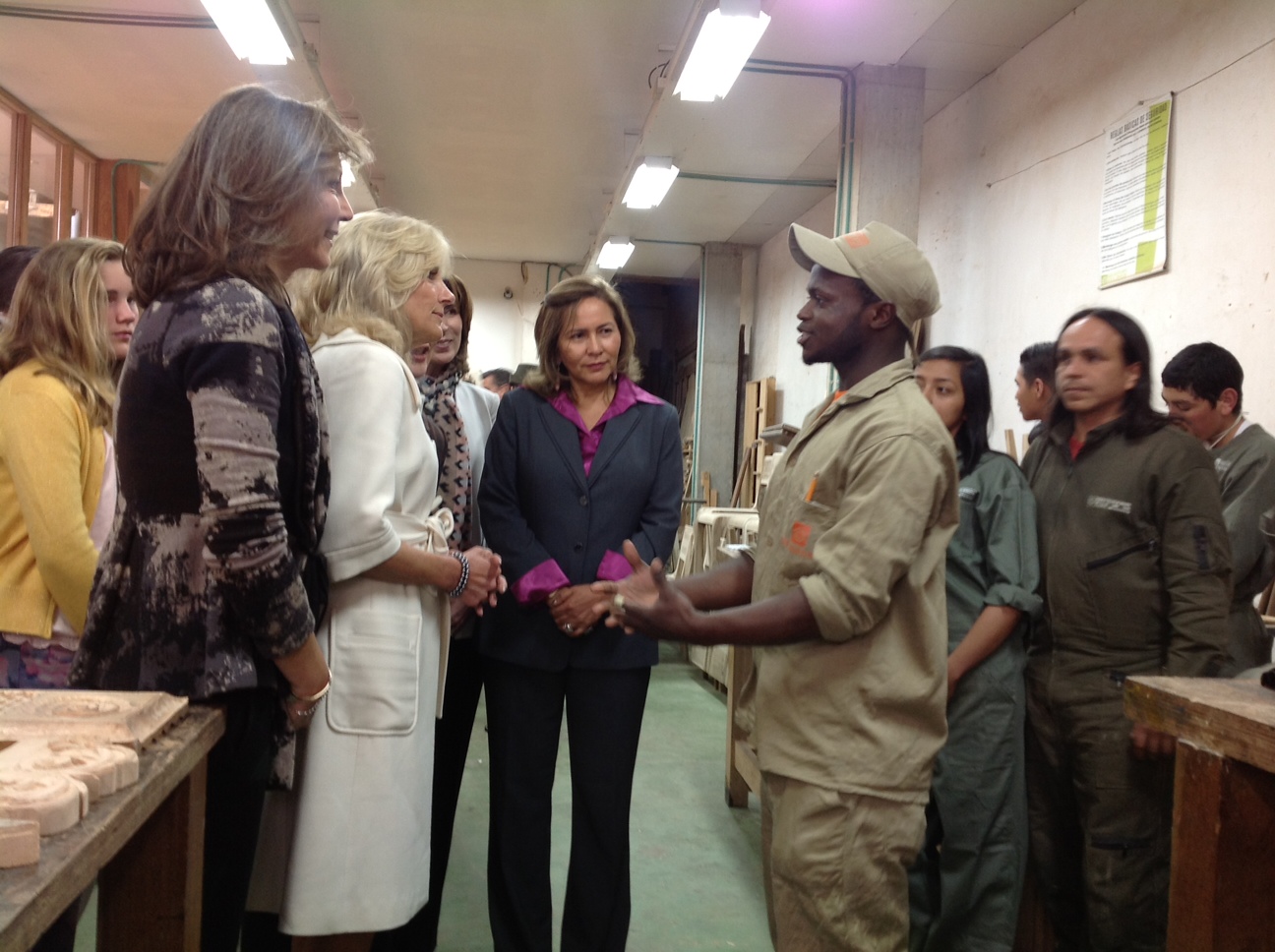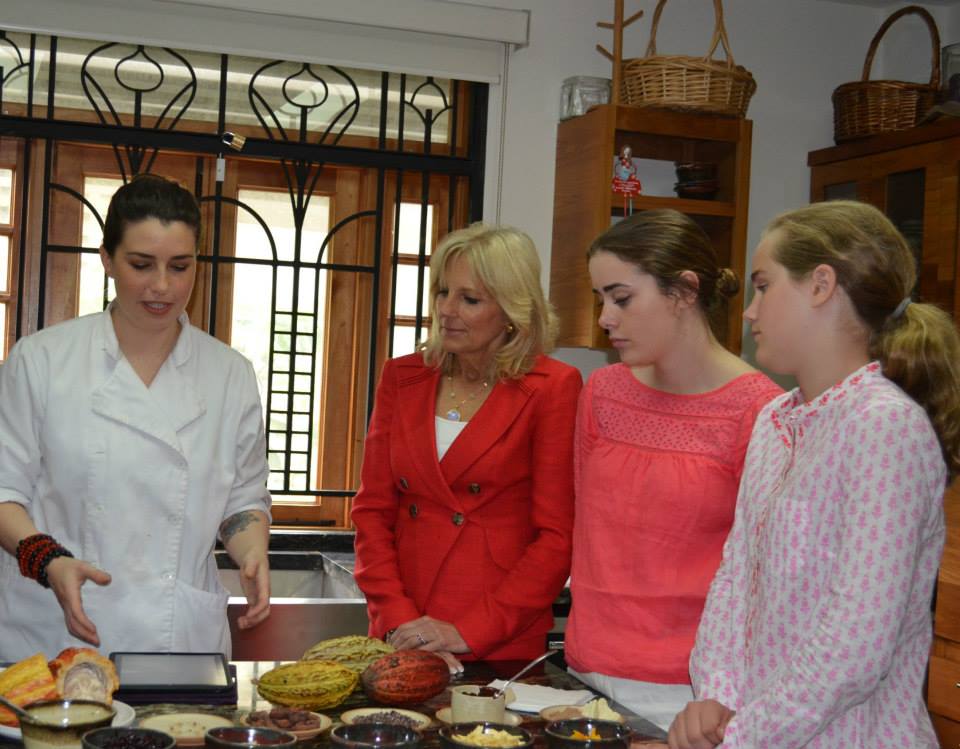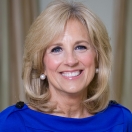
Last week I had the pleasure of accompanying my husband Joe on a trip to Colombia, Trinidad and Tobago, and Brazil. In each country, I witnessed the good work of the United States to promote economic growth and development through education and empowerment of women entrepreneurs.
Colombia: Vocational Training for At-Risk Young Adults
As an educator for more than 30 years, I enjoy meeting students wherever I go. I love to hear about their experiences and see exciting and innovative programs that are working. One of those programs is the Escuela Taller in Bogota, which I had the pleasure of touring with Colombian First Lady María Clemencia de Santos. Escuela Taller is a vocational school that serves low income and high-risk youth and provides training for jobs such as carpentry, culinary arts, construction and wood working.
Since 2006, USAID has provided funding to the Bogota, Cartagena, and Buenaventura locations of Escuela Taller, funding that, in part, supported the construction of the school’s in-house restaurant and kitchen. Through the U.S. partnership, the school is mitigating gang recruitment risk factors such as lack of education, unemployment and low-self-esteem for young adults. Alumni like Jonothan Medina who attended the culinary school are now dreaming big – he wants to study in France at the Cordon Bleu! In fact, over 90 percent of the graduates from the culinary program are employed in local restaurants.
Trinidad: Women Entrepreneurs Invigorate a Local Trade
As I travel around the US and across the globe, I always notice the important role women entrepreneurs play in local economic development. Trinidad and Tobago is known for its high-quality cocoa beans, but they only make up about 5 percent of the world’s market. Women like Isabel Brash, owner of Cocobel Chocolates, and Darril Astrida Saunders, owner of Exotic Caribbean Mountain Pride, use only local products from start to finish and are trying to revive the local cocoa trade, while simultaneously promoting women’s entrepreneurship.
I toured Isabel’s kitchen and saw her turn cocoa beans into delicious bars of dark chocolate. I also heard from Darril how the U.S. State Department’s Women’s Entrepreneurship in the Americas (WEAmericas) and the International Visitor Leadership (IVLP) programs provided her with business training and networking opportunities. WEAmericas connects women entrepreneurs from throughout the Americas and leverages public-private partnerships to increase women’s economic participation.
Rio de Janeiro: Public-Private Partnerships Help Brazilians Generate Income
I currently teach at a community college. The students at my school often overcome obstacles to be there: working multiple jobs, raising a family, caring for loved ones. They’ve made sacrifices in order to go to school, but they’re doing it because they want to improve their lives and be able to contribute more to their community.
This isn’t just happening at my school in Virginia, but all around the world. And it’s not just happening on college campuses, but in community centers just like the Espaço Criança Esperança (ECE) in the Cantagelo favela in Rio. ECE's centers aim to ensure the rights of Brazilian youth through sports, cultural, educational and community engagement activities on full-time basis.
At ECE, I met with students from the Coletivo Varejo program, part of Coca-Cola Brazil's Coletivo CSR platform, through which Coca-Cola integrates its supply chain in order to transform the lives of thousands of people by boosting self-esteem and generating income.
Programs like Coca-Cola’s Coletivo go into communities and work with young people where they live. They provide skills and training, not so people can outgrow or leave, but so they can better the community and themselves.
The young people I met in Rio are a great example of how American companies can partner with other countries to help empower people to reach their full potential.
Brasilia: Youth Ambassadors 2014
During our visit to Brasilia, I had the pleasure of meeting a group of impressive, young Brazilians. They are students making a difference in their communities, achieving academic excellence and representing the best of Brazil to the United States and the world. They are Youth Ambassadors.
The Youth Ambassadors participate in a three-week exchange program in the United States. They focus on civic education, community service, and leadership development. Of course, they also practice their excellent English skills and experience firsthand the culture of the U.S.
Since the program was first created in 2002 by the U.S. Embassy in Brazil, more than 300 students have participated in the program, though thousands have applied! I was excited to kick off the application period for enrollment in the 2014 Youth Ambassadors program. Good luck to all the applicants.




